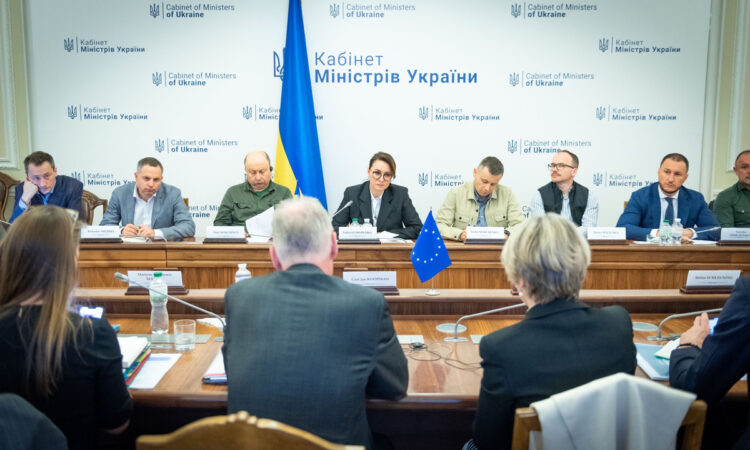
On Feb. 1, the EU’s 27 leaders agreed a €50 billion aid package for Ukraine in the next four years. The funds will be provided in a framework designed by the European Commission called the “Ukraine Facility” which will cover all non-military aid.
€39 billion will go towards budgetary support of Ukraine. However, the program schedules payment in tranches subject to Ukraine implementing reforms in certain areas, Oleksii Sobolev, Deputy Ukraine’s Minister of Economy, said in an interview with Kyiv Post.
He said that supervision of the Ukraine ‘s progress will be included in the final EU requirements. Currently, it will be conducted by an audit board, that includes Ukrainian representatives.
Over the four-year period Ukraine must fulfill more than 100 EU requirements, divided into quarters. So, the funds for each element of reform will be provided in the quarter in which it is implemented.
Kyiv Post asked Sobolev about the conditions attached to the aid package.
The Ministry of Economy announced that Ukraine can get the first tranche of €4.5 billion in March. But already in December 2023, Ukraine’s government approved the draft plan of the Ukraine Facility. What is happening with that plan now?
EU leaders approved the budget of €50 billion over the next four years.
These funds are already set aside, and we will definitely get 50 billion euros over four years.
But conditions for the provision of these funds have yet to be approved. For now, a three-way discussion between the European Commission, the European Council and the European Parliament will approve the requirements, after which the parliament will vote at the plenary session on February 26-29.

Other Topics of Interest
Ukraine to Introduce Online Video Marriage Services Through eGovernment Portal
In its latest innovation, Ukraine’s Diia government portal will allow citizens to get married remotely via video, a function that could be especially useful for deployed troops.
One of the requirements is that Ukraine must submit its official plan in early March.
The EU will then study the plan, decide whether it meets the requirements, then the program will start. For the implementation of the reforms prescribed in the plan, we will receive funds every quarter. However, it will be several weeks between the approval of the requirements and the program being fully operational.
Therefore, in early March, we will sign a memorandum with the EU, which provides for €4.5 billion in transitional funding which we believe will be provided in March.
Doesn’t Ukraine already have a draft plan? Why can’t it be sent for review now?
Because the final requirements of the plan are not yet finalized. Yes, the government has approved a working version, which was designed in consultation with the European Commission. But this is definitely not the final version.
Everything did not go as planned by the European Commission. The terms of the program were to be approved in November. Then the Ukrainian side was to prepare and submit its plan within several months. And on Feb. 1, the EU would approve €50 billion, and everything would start.
But the opposite happened – the money was agreed first, and the decision on how to provide it has to follow.
The presentation of the program claims that €50 billion will be provided to Ukraine in the form of grants and loans. How much of this amount is actually non-refundable aid, and how much and when will Ukraine return?
We will find out the final requirements at the end of the month. But, most likely, they will be the same as those in the draft plan which were voted for last fall.
€17 billion will be provided as a non-refundable grant. €33 billion will go as loans that must be repaid. But the loans will be on very favorable terms: the body of the loan does not need to be returned in the first 10 years, and the interest rate will be very discounted for Ukraine.
Moreover, about €1.5 billion was “incorporated” in the grant to cover the difference between the market rate for such loans and the discount rate, which has not been approved so far. So, €50 billion includes this difference to provide us with soft loans, for example, over the next 20 years.
The website of the European Commission also clearly states that these funds cannot be used for defense spending. Does this mean that the EU will consider funding for Ukraine’s other needs, or because of this large aid package, we should not expect additional funds in the near future?
As the EU explained to us, they prefer all European aid to Ukraine over the next four years, except those for defense, to go through the Ukraine Facility program.
There will be a separate special EU program for defense assistance, which is being discussed.
Do you mean the €22 billion, which are being considered for compensation of bilateral military aid to Ukraine by EU members? I believe such a decision was not made at the extraordinary summit on Feb. 1.
Yes… Speaking about the amounts: it is not true that both of them are large amounts. First, this year Ukraine`s budget deficit is just over $40 billion.
Of course, we are grateful for the €50 billion, but it does not sufficient for Ukraine’s macro tasks.
The second question here is whether the European Union is able to mobilize significant funds when itself faces danger? Yes, it can. And €50 billion over four years for the EU is some 0.125.% of its annual budget. We can compare it with the amount that was mobilized to support the economies of its member countries during the covid pandemic – at that time there was a program of about €750 billion.
So, the amount of €50 billion plus €20 billion for defense assistance does not look like something beyond the European Union’s capability, and it is not a problem.
Which conditions will be applied to Ukraine to receive these funds?
Quarterly indicators will meet the reforms that will be defined in the Plan for the Ukraine Facility program. They are divided into three blocks – basic reforms, economic reforms, as well as priority sectors for development.
The first one is the basic requirements, without which Ukraine’s further progress and integration into the EU are impossible.
For example, these are reforms of public administration and public finance management. For the last one we have already approved the National Revenue Strategy. Or is it a public investment management road map, which has already been approved by the Ministry of Finance.
The next component includes judicial and anti-corruption reforms and protection of property rights.
For example, Ukraine’s parliament recently passed a law to increase the number of NABU detectives, which was also one of the requirements discussed within the plan.
Next is the block of economic reforms. In order for Ukraine to develop quickly, a better business climate is needed.
Here we can talk about the reform of the fuel-energy system, the reform of state property management – the last one is about both privatization and corporate reform.
It is also a reform of the management of financial markets, including state banks, a strategy for solving the problem of non-refundable loans.
Separately, there is a reform of digitization of the work of various state bodies, for example, customs.
And the last block includes six strategic sectors, where reforms should be implemented as they will be the drivers of economic growth in the next four years.
These are energy, transport and logistics for export, agricultural sector, IT, critical materials, manufacturing industry.
So, in each area there will be several reforms that must be implemented. In total, there will be more than a hundred indicators over four years.
However, Ukraine has either already fulfilled or is fulfilling some of them: draft laws have already been developed or voted in the first reading… Furthermore, many of these requirements are synchronized with those that we have committed to fulfill under agreements with the IMF, the World Bank, the EU and other programs.
In fact, this is a four-year plan for the economic component of the reforms, and it is a very good basis. So, investors can read what Ukraine is going to do, make their expectations and invest here, knowing that certain reforms will be implemented…
What if Ukraine is not be able to implement a reform or do it slower than expected because of the war?
The mechanism within the Ukraine Facility works in such a way that if we have not implemented a reform within the deadline, we have 12 months to implement it. And in the quarter in which it will be implemented, money for this indicator will be provided.
The program’s progress will be monitored by a special audit board, which will be formed by Europe with the participation of Ukrainian representatives. And Ukraine should also create its own monitoring system for the program’s implementation.
The conditions regarding supervision are “incorporated” into the program itself, and they will be.






